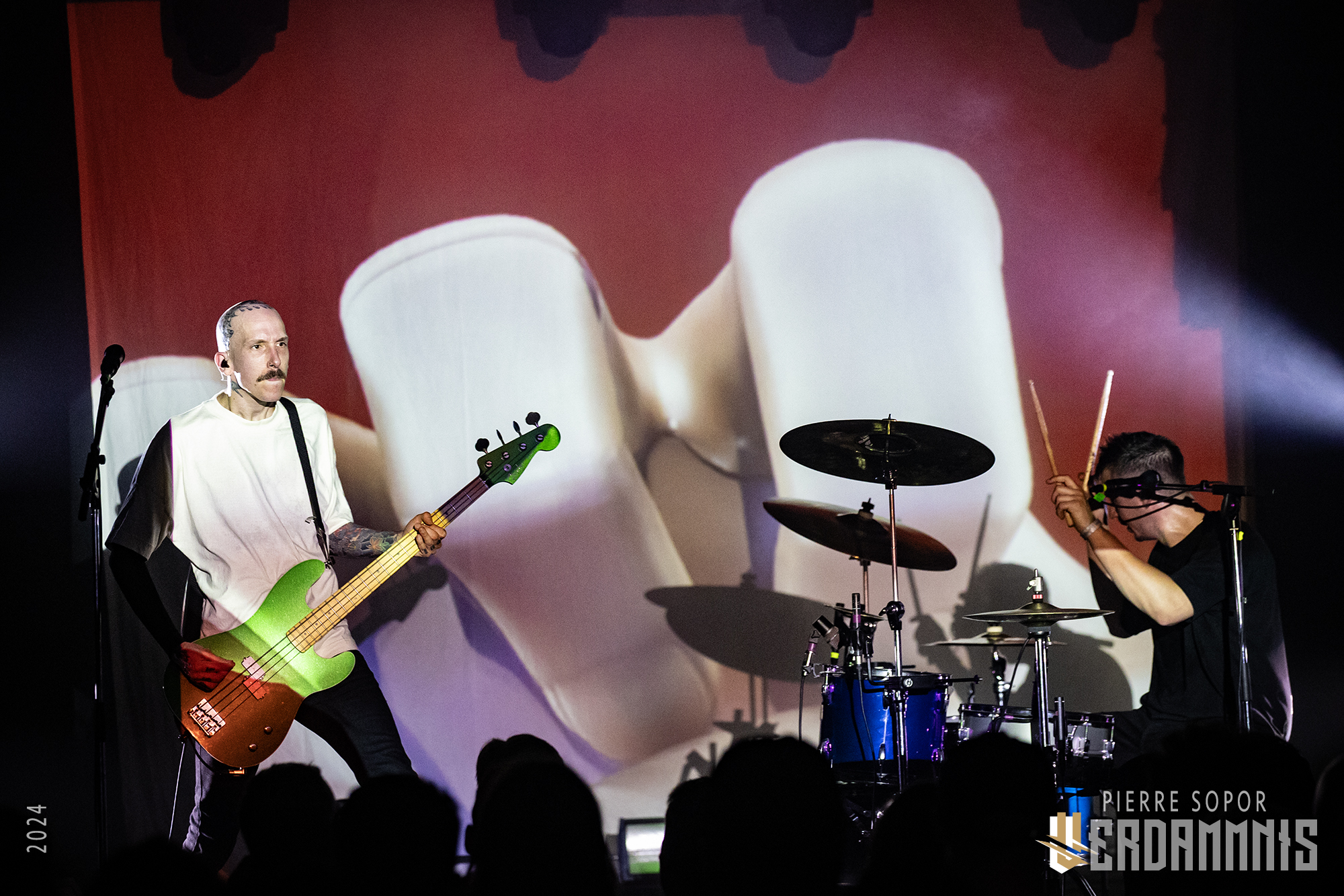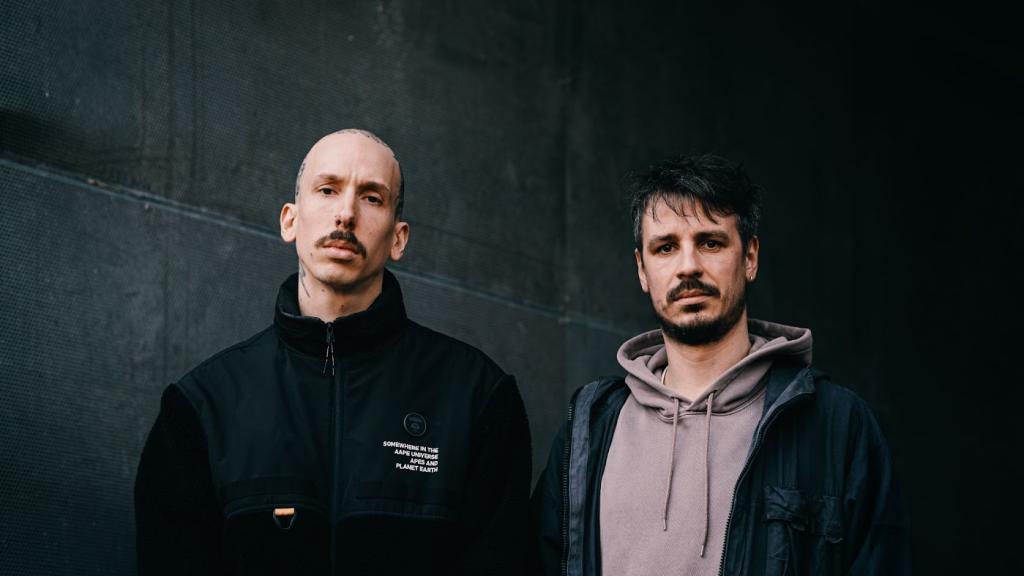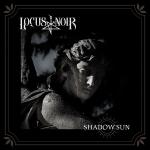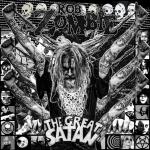We owe Doodseskader ("Death Squad") two of our fondest memories of the Motocultor Festival 2025: first, when the Belgian duo came on stage and gave it their all with rare intensity (more on that soon), and second, when Tim De Gieter and Sigfried Burroughs took the time to answer a few questions.
Still shaken by their performance, we were almost surprised to see their gentle, dreamy eyes and the humble kindness that shone through in the words of the two artists, who were clearly still haunted by their concert, which had ended just over an hour earlier... Doodseskader doesn't care about labels (industrial? rap? grunge? metal? pop? weird? whatever!) and continues to dig in its intimate universe, with absolute integrity and a spontaneity that is inevitably touching, and talks to us about the vital necessity of this project.
Above photo credit: Diana Lungu
You often talk about the importance of being completely sincere in your music. Does this approach have any consequences for you?
Sigfried : Yes, it hurts. I felt it. Today, I was really into our music, and I really felt that pain. It happens from time to time, but never during the whole set. Normally, there are changes, feelings change between songs, and there are different levels of understanding of what we're doing.
Tim : It's not easy. We never thought that songs would become so complex to play because when you write something, it's not necessarily an aspect of yourself that you like to show. I think that at the time, neither of us thought we would have to say it so many times in front of an audience, and it's becoming more and more complicated. Not in the sense that we don't want to do it, but more because we know where we're going to dig and we know it's going to hurt. There are days like today when it's not easy. Revisiting these aspects inevitably has consequences for your mental health. I'm not going to lie about it, it's not just playing songs, we're not just pressing play and then leaving the stage saying, “Okay, yeah, good show, time for drinks!” Maybe “risky” is a big word, but there is still a certain risk involved. I can only speak for myself, but sometimes certain songs really drag me down very quickly, they pull me under.
There's something cathartic about it all... but doesn't writing and working on these dark moods keep you trapped in them all the time?
Tim : We're really trying to get through this, to get out of the darkness. We really are. You can only get out of it once you've understood what's wrong with you and who you are... I think a lot of people internalize a lot of things and don't know themselves very well or don't dare to... You see, when someone asks you, “How are you?” you're never gonna answer, “Well, man, on Monday this happened, on Tuesday that happened, etc., I'm adrift and I need someone to help me.” No, you're just going to say, “I'm fine” or “I'm having a tough week,” but you're never going to go into detail. Whereas here, we go deeper.
Do you have a ritual between yourselves after concerts to help you get out of that state of mind?
Sigfried : I usually feel much better after concerts, even though that wasn't the case today. Normally, it's a good dose of endorphins. You've made the journey, you already know the story behind the songs because they're about you, you've re-read what you've done, a part of your life, and then I say to myself, “OK, that's it, it's over.” You relive the past a little, but then real life and the present take over again.
Tim : We don't really have a ritual because then it would become something repetitive. We don't want repetition because things need to remain spontaneous, real, tangible. If we started saying to ourselves, “We'll go off stage and do the same thing every time for half an hour,” I think it would lose its authenticity because I already know how it's going to go, how everything is orchestrated, and there would be no reason to do it anymore. It's putting on a show, it's a bit like being a clown. The world needs clowns, and that can be great too, but if you really want to create a mirror to show who you are, you just have to live your day, get on stage, and see how it goes. Sometimes it goes well, sometimes it goes badly. Before the concert, we always give each other a hug, though! That's something we've done since day one because it's also important to remember that there are two of us. There's a song called FLF, and it's complicated for me when we play it because I see myself every time, and I don't want to see myself so often so clearly... But at least I know Sig is there, I can lean on him and he really understands me. I think that hug is an important moment because we have to remember that no matter what happens, no matter what we say, we're okay. We're there for each other.
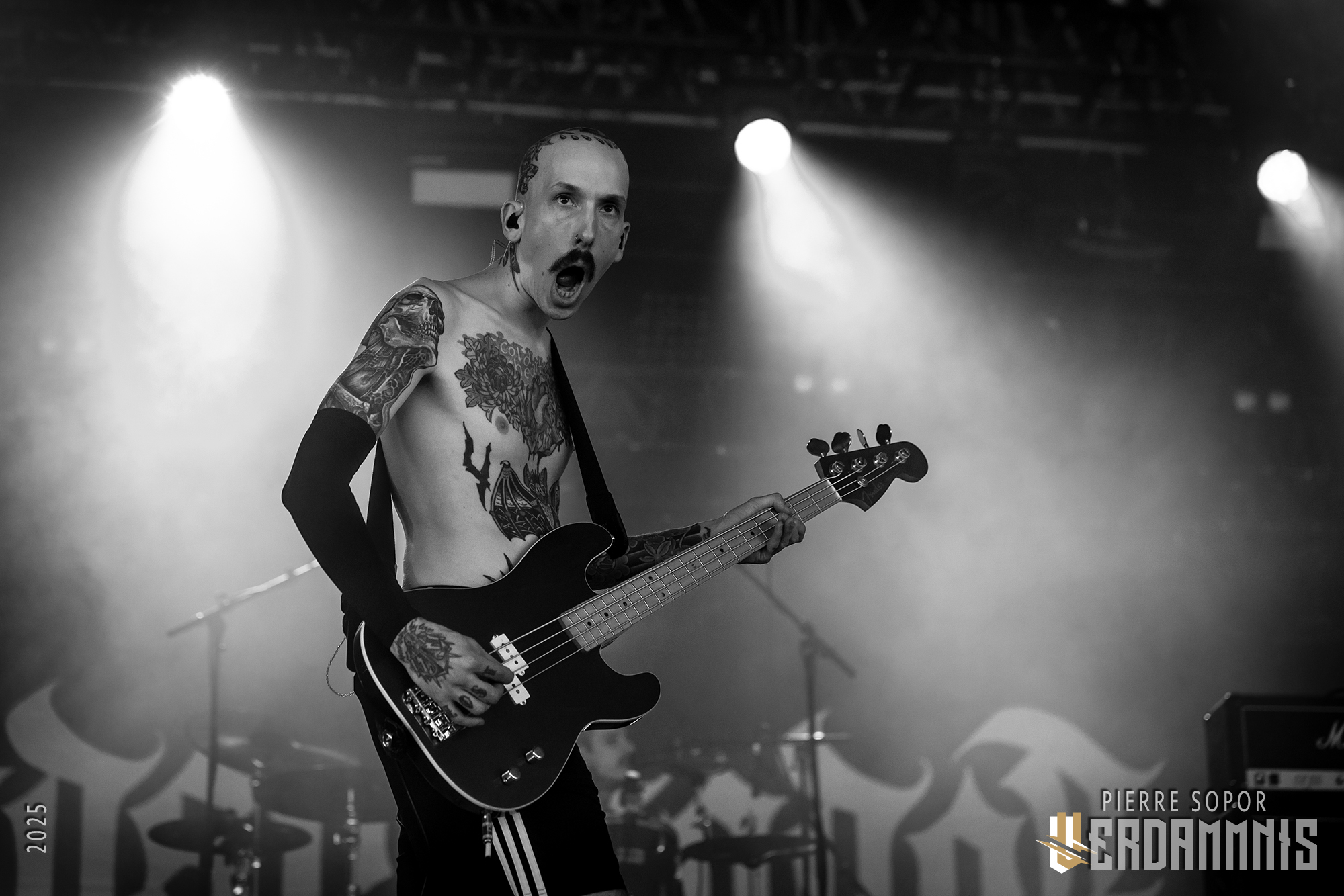
By playing these songs over and over again, are you unable to create a sense of distance or find peace with them?
Sigfried : It depends. Personally, I can find things that I hadn't understood before, and that's beautiful; it always stays fresh.
Tim : Yes, it changes... It's like when you write something down when you're 25, you put your honest thoughts on paper, and then a year later you reread it and you've already evolved so much, especially with this exercise of putting your thoughts on paper. You look at it and say to yourself, “Oh yeah, damn, that's how I was last year!” Five years later, if you reread it, you'll say to yourself, “Holy shit! I've come a long way!” Maybe for the better, maybe for the worse, but you'll have a better idea of where you stand. That's what's interesting, because if I wrote about dragons and stuff like that, man, you'll see that next week the dragon will still be a dragon, and in three months, same thing!
As we get older, anxiety and anger sometimes fade away. Can you imagine Doodseskader then ?
Tim : That's the goal! People must think I'm joking when I say it, but I really hope that one day we'll do reggaeton. Seriously! We're not hiding it, we're really trying to get away from this negative stuff. We don't play metal because it's our biggest dream to play metal, we play metal because if you want to dig a hole, you need a shovel! Today, we still need that shovel to dig, but maybe in a year or two that will have changed. And the truth is, we don't really know what we're doing. It's not like we start out saying, “So now we want a heavy riff, and here we want something technical”! We just sit down and start without discussing the form of the thing, the thing happens by itself. It's spontaneous. We've never really decided on a direction for what we do, so we can't say what it is. I really hope we'll be doing pop or something lovey-dovey in three years. I wouldn't be ashamed to do that because it would be honest too. Our trademark isn't being a heavy band, our trademark is just being ourselves.
But even if you do reggaeton or pop, it'll still be a bit weird, won't it?
Tim : Yeah! Because we're weird people!
Sigfried : I read something yesterday that I thought was really beautiful. If you make art in any form, you take a risk. I sometimes feel that many people have lost sight of that risk, when it's actually what makes art beautiful. You have to take risks to achieve something special.
Tim : We're all weird, I think. Come on, let's say it now, I agree: yes, we're a weird band! But we're only weird because we're us. You're probably very weird too! If I came into your living room at 11 p.m., I might think to myself, “What a weird life they have, they're really very strange people!” There's nothing wrong with being weird! I feel like when people say “weird,” it means you fall out of the boat, but when you accept your weirdness, you realize that's the norm. Being normal is being weird. It's just that you dare to be more in tune with yourself, and people say, “Holy shit, that's something!” Yes, it is something, but we're all something. I'd like to see people's weirdness more often, I'd like everyone to be able to express it completely freely and without being ashamed of themselves. Maybe you like pink pajamas, and I'm not going to judge you for that. That's it. Ultimately, for me, nothing is really weird: if you dream of being a horse, well, there you go, you dream of being a horse! I don't have the time or energy to judge. Weird is normal.
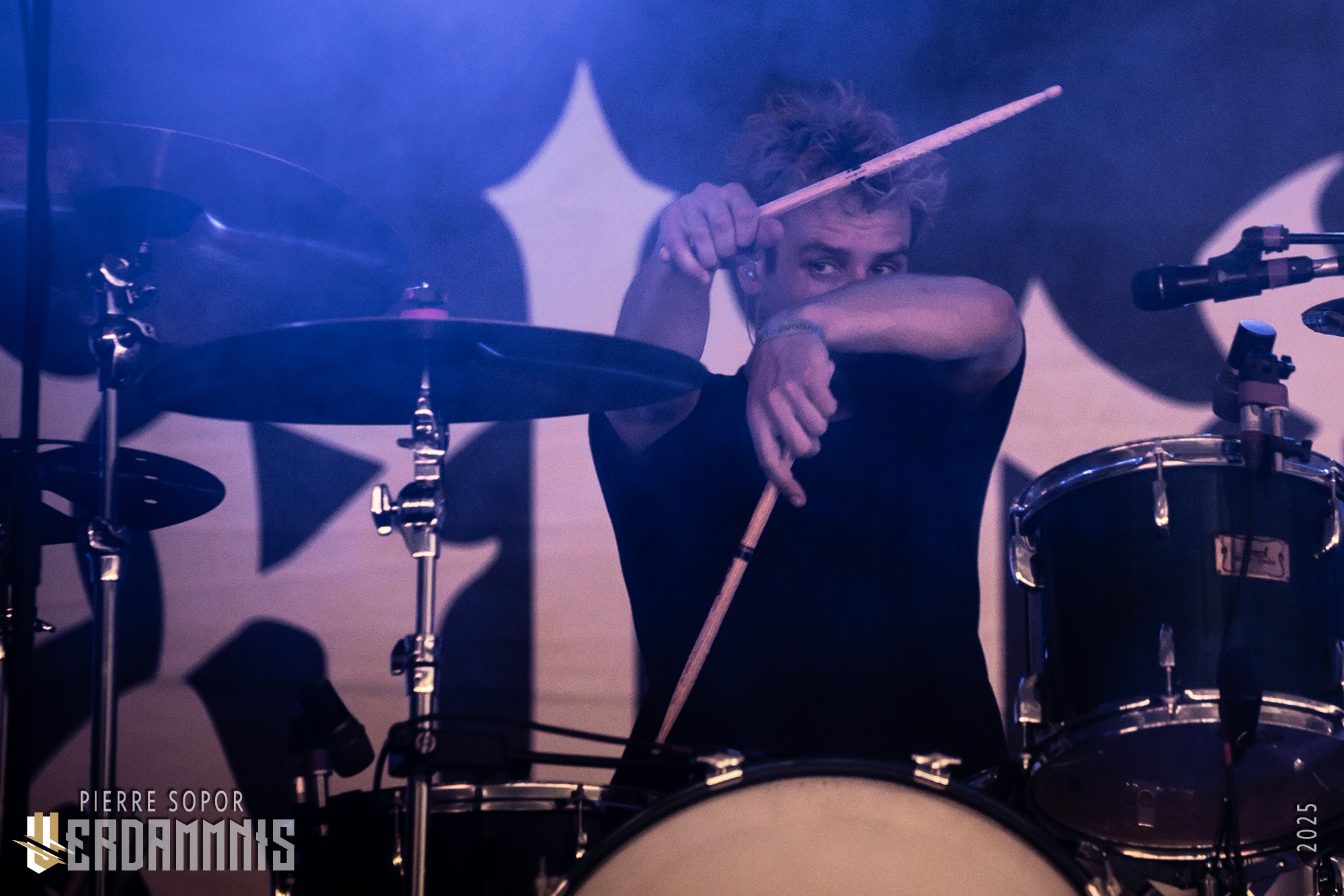
Transcribing this into your music requires a certain talent. There are, however, forms of artistic expression that are more codified...
Tim : Unfortunately, that's the business side of the music industry. The business demands that you conform more to the norm. They say, “We're doing a themed festival, what theme do you fit into?” or “We're doing a themed playlist,” etc. But that's not what's important. Imagine you're putting together a gallery with painters, a huge gallery, and you fill it with only one painting done in the same style by 15 different painters. You won't see the difference, and after seeing it fifteen times, you'll say to yourself, “Damn, this is boring as hell!” I feel like streaming platforms, labels, and all that stuff are really pushing for the homogenization of music. It's good for them because they can make more money! Because if you like Iron Maiden, good news for you: they have six other bands that sound exactly the same to sell you! You're going to buy concert tickets and T-shirts from these bands, and the label will be delighted to cash in.
Sigfried : It's a bit strange to have someone between the creator and the audience. It changes a lot because, for example, if you're here at Motocultor and you like pink pajamas and reggaeton, you might feel out of place... but that doesn't mean anything because if suddenly there's a band in pink pajamas playing reggaeton here, that's cool too!
What's more, at Motoc', everyone would go and see them! You radiate a lot of kindness when you address the audience, and you also mentioned the hug you give each other before every concert. Yet the music is dark, and Doodseskader is a slightly scary band name... Have you ever asked yourselves what you want the audience to feel, or is it purely personal?
Tim : It's personal. I think that the day we start thinking about what the audience would like to hear, we'll have to stop playing. It wouldn't make any sense anymore.
Sigfried : For me, it's like the intermediary between the artist and the public who tells you what's expected of you because there's a kind of demand for it. Picasso never thought, “Hey, I'm going to do Cubism to make something weird.” He just did it.
Tim : I'm just being honest and showing myself for who I am, saying that I'm just a guy with nothing special, I have lots of flaws, I don't want to be put on a pedestal at all... It's sometimes very embarrassing because this job means that people put me on a pedestal anyway, but I don't want that. I just want to show myself as a human being and show that it's okay to be who we are, with our backgrounds and our problems. It's more valuable when one or two people recognize themselves in my story or see something in it that applies to their lives than if I say, “We're going to write love songs so that all people in love will recognize themselves in them.” That wouldn't have any value because maybe tomorrow when you wake up you'll say to yourself, “Damn, everything's going wrong, I lost my job, I lost this or that... and I can't take it anymore”... and I'll be there like an idiot singing love songs so you'll take out your wallet?
You released your two albums about two years apart. Year Two is almost two years old now. Can you tell us anything about the next one yet?
Tim : Not really at the moment! What we can say is that it will be even more unexpected. The whole project has been quite unexpected, but this time we've opted for the most special route yet.
Sigfried : I think we are looking for ways to present ourselves in an ever purer, more authentic way.
Tim : We need a bigger shovel to keep digging, actually! We're forging a huge shovel... huge! We're doing the work, we're really doing it. I can't say more, but I can say that this time, we're documenting parts of the process to show how we do it. Just for us, keeping this document to look back on in ten years and wonder how we did it will be interesting! It's a very special time, and that's where I have to stop talking about it because otherwise our manager will put my head on a spike!
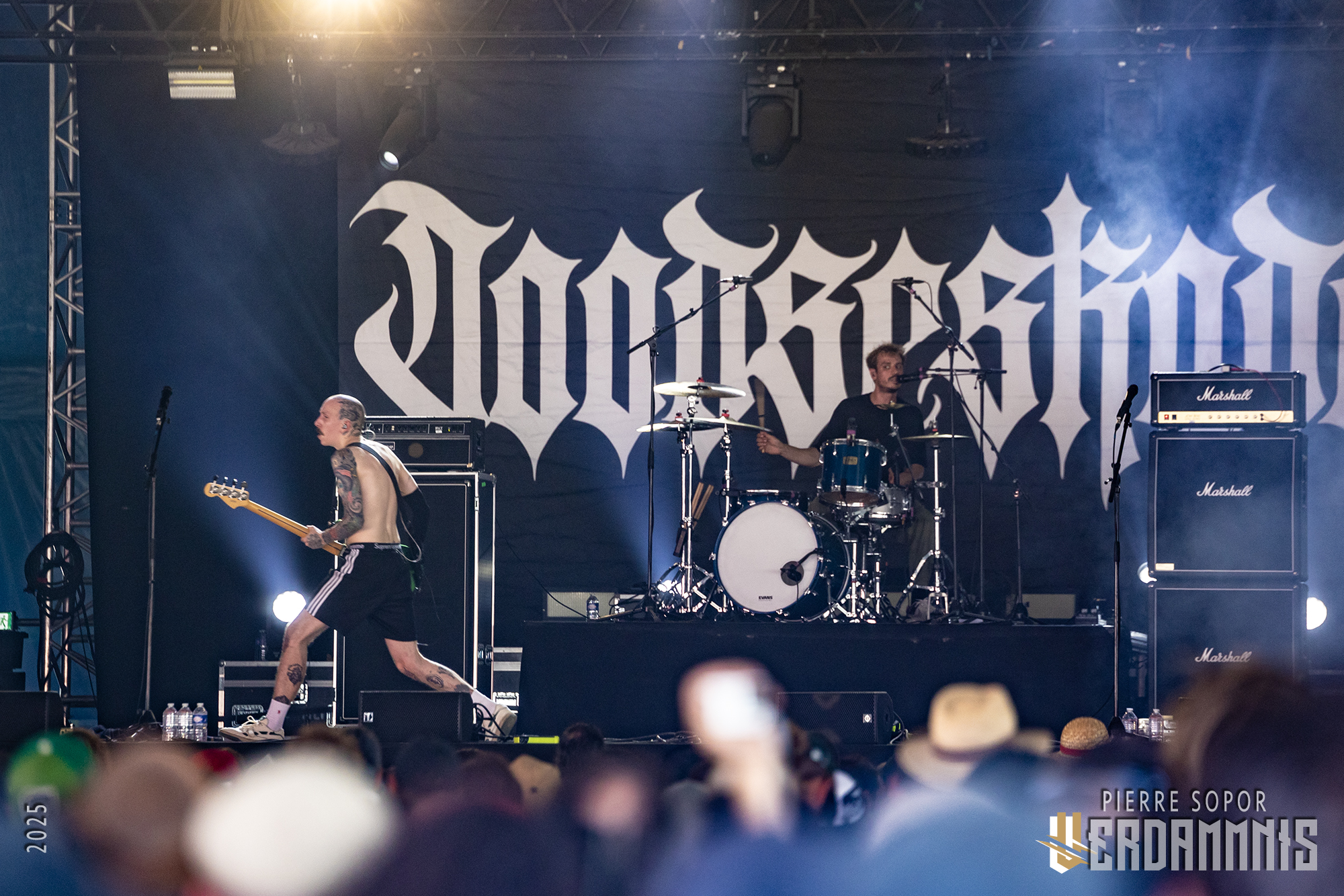
Tim, you recently left Amenra. We read that it was so you could devote yourself fully to Doodseskader. Does a project like this require such a huge commitment that it leaves no room for anything else, either in terms of time or emotions?
Tim : No, I never said that. A lot of people write a lot of things, but I never told anyone that I left Amenra for that reason. I see this kind of nonsense circulating and, to be honest, it hurts me deeply because I never said it. That's not the reason. I'll just say it plainly, so it's clear once and for all: I left Amenra because I didn't feel 100% comfortable with the direction the band was taking. That's what I said at the time, and that's what the band relayed as a statement. I was afraid that I would feel less and less connected to it over time, and that feeling is the only thing that really matters in what I do. I've always said that if one day I go on stage with Doodseskader and play a note that I don't feel 100% about, I'll sell all my stuff and stop making music. I really play to purge what's inside me; there's a physical aspect and a mental aspect. I played every Amenra concert with the same honesty, the same intensity, and I was afraid that eventually I would end up just playing to be a musician, and that wouldn't have been honest of me. That's not what people deserve. People really deserve to have us devote ourselves completely to our art.
Besides Doodeskader, I do a lot of production work for other people in many different styles. I make a lot of music that will never be released. I have hard drives full of music, some hard style and R&B tracks that will never see the light of day! I listen to it in the evening while smoking on my terrace. I do it just for myself, to have a soundtrack for my own life. I still do it with the same passion... But I admit that right now, when I wake up, Doodseskader is my first thought, and in the evening, before I go to sleep, it's also my last thought before I close my eyes.
You've released two tracks for video games recently. Do you have time to play a little?
Sigfried : I don't play videos games.
Tim : He has a son, it's different, he can play with his son! Me, on the other hand, yes, I like it! I get up early in the morning so I can play for an hour a day. I have an Xbox and I play a lot of games. Often RPGs, that's what I like best. I'm a nerd, I'm not going to lie to you about that, I'm not ashamed of it! Man, if you saw my saves on Elden Ring and the amount of time I've spent on it... I don't think you'd feel good about it! Me neither, actually, it makes me feel a little ashamed! But I'm passionate about it, I always have been. I can completely disconnect thanks to video games. I like Final Fantasy and stuff like that, where I can get completely caught up in the story and not think about my life. I don't like shooters and stuff like that. I've tried everything, I go to the gym too... but when I'm working out, I'm constantly thinking about Doodseskader and I come out even more angry! So video games, in a way, are my safe space...
That's very interesting because your music is very grounded in reality and everyday life, whereas many people seek escape in art...
Tim : That's not the case for us. I think we need this. We've found something in what we do. When we started this project, neither of us would have thought that we would change so much as people. After three years of writing about our lives, we saw each other, we saw what it did... I feel like it has changed me profoundly; the effect on my life is immense. It's not just that the band is part of my identity, but my identity is also changing because of this band... and because of Sig, above all.
Sigfried : I have also learned a lot and changed a lot thanks to Doodseskader. It has a huge influence on our lives.
